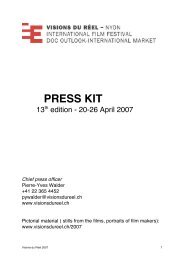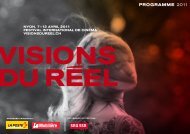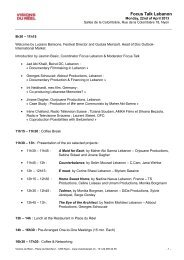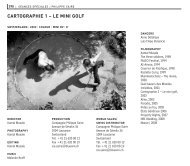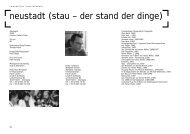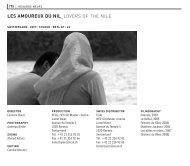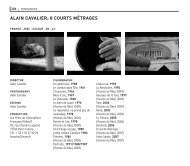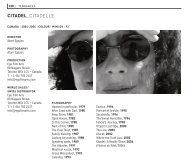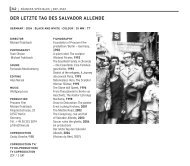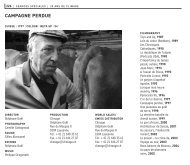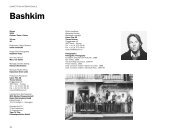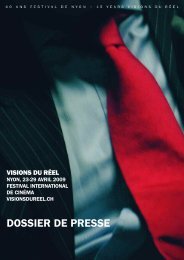Katalog 2013.pdf - Visions du Réel
Katalog 2013.pdf - Visions du Réel
Katalog 2013.pdf - Visions du Réel
Create successful ePaper yourself
Turn your PDF publications into a flip-book with our unique Google optimized e-Paper software.
atelier – eyal sivan<br />
219<br />
un specialiste<br />
those viewers who are bored by the film<br />
because they think it is just a flow of<br />
talking heads will ask the question: “Are<br />
these people really together Are they<br />
listening to each other Do they know<br />
what the others are saying”<br />
In my opinion, this is a very interesting<br />
reaction because it raises a double<br />
question: about the film and about reality.<br />
So the question becomes: what and<br />
where is the space where speech can<br />
take place One of the things that really<br />
impressed me was the quality of the<br />
discourse. Not because of the sophistication<br />
of the people involved, but<br />
because of the quality of the listening.<br />
This is the true ‘mise en scene’: it’s the<br />
‘mise en scene’ of the act of listening.<br />
Therefore the film device becomes<br />
a tool that allows the viewer to question<br />
how people can live together. The<br />
device becomes a thinking device. A<br />
political device.<br />
Absolutely. The film device itself makes<br />
a statement about reality. A statement<br />
that is not merely aesthetical about<br />
reality. It is not representation. It is one<br />
possible presentation of reality. It is a<br />
cinematic statement. In a way, while<br />
there have been pretentious attempts<br />
for years to build something that was<br />
a relation between a political and an<br />
esthetical discourse about maybe the<br />
most represented historical element<br />
in the world, the Israeli-palestinian<br />
conflict, Etat commun – Conversation<br />
potentielle [1] is an actual proposal. A<br />
proposal for a stance.<br />
Most documentary films do not deal<br />
with the notion that ‘mise en scene’ is<br />
a political stance. Most documentary<br />
filmmakers seem to believe that fiction<br />
needs a ‘mise en scene’ while in<br />
documentary the nobility of the subject<br />
is enough.<br />
‘Mise-en-scene’ is a construct in the<br />
documentary. There is an idea there that<br />
maybe goes again back to what we were<br />
saying about the truth, about this whole<br />
idea of pureness. If we don’t intervene,<br />
if we let things just happen, if we record<br />
reality, eventually we will get closer to<br />
the truth. This is the pretentious side of<br />
cinema and documentary, while for me,<br />
if I were asked a question about it, is the<br />
exact opposite. This is what Potential<br />
Conversation is about. First of all: a<br />
‘mise en scene’. You pointed it out: it, it<br />
is the ‘mise en scene’ of a discourse. This<br />
becomes a political proposal. Not the<br />
discourse in itself, but this way of relating<br />
to reality, of thinking in images. The<br />
way I try, at the very beginning of the film,<br />
to point out that the notion of one state<br />
is not a question of the future because<br />
there already is one state. The question<br />
is what is common in this state. And here<br />
comes a proposal of what is common.<br />
Most people should be reminded that<br />
when the Lumière brothers filmed the<br />
workers exiting the factory they reshot<br />
it because the first take did not seem<br />
real enough.<br />
Of course! We should also remember<br />
Robert Flaherty’s Nanook of the North,<br />
which actually is the second shooting of<br />
the film because the first rushes were<br />
accidentally burned. So when Nanook<br />
is playing Nanook, there is a ‘mise en<br />
scene’. And it is this ‘mise en scene’ that<br />
makes a document out of Nanook. Not<br />
the lack of it.<br />
In terms of being a filmmaker who<br />
deals not with the future but with the<br />
present, where the present becomes a<br />
construct for the device that ultimately<br />
becomes a political proposal, how do<br />
you work with these kinds of tools in a<br />
society that has a totally different take<br />
on what is the truth<br />
Nowhere in the world had I to en<strong>du</strong>re so<br />
much criticism, so many debates, arguing<br />
constantly about my so-called “lack<br />
of objectivity” and the fact that I was<br />
“manipulating reality”. This happens all<br />
the time in Israel. In Israel, in a television<br />
show dedicated to documentary<br />
filmmaking, I had an interview about<br />
Jaffa – La mécanique de l’orange. The<br />
guy that was con<strong>du</strong>cting the interview<br />
started to lose his temper accusing me<br />
of having changed the story, of having<br />
manipulated the facts, deconstructed<br />
events. “You totally manipulated the<br />
story.” My answer was: “Yes, I did.” What<br />
happened then was that he started to<br />
shout at me. He was completely lost it. I<br />
tried to explain to him: “This is the history<br />
of documentary itself.” At the end of<br />
the interview he came to me and said:<br />
“You know, I was absolutely sure that<br />
when I told you that you’ve manipulated<br />
the facts, you’d have defended yourself.<br />
But when you said, ‘Yes I did’, I didn’t<br />
have an interview any longer because<br />
I was prepared for a completely different<br />
thing.”<br />
I’m telling you this story because<br />
indeed the problem in Israel, when you<br />
ask how I can work, is that I have to<br />
answer: I work from outside. It’s almost<br />
impossible to work inside. Because<br />
when you’re working inside you have<br />
to take into account this impossibility<br />
to have different points of view. It<br />
sounds so banal, but this is an element<br />
that shapes a society that is more and<br />
more closed in on itself and paranoid.<br />
The result is that it builds up a double<br />
violence, an internal one and the one<br />
directed outside. It is what we call fascism.<br />
What characterises a society like<br />
this one is the lack of imagination and<br />
the inability to see the possibility possibility<br />
that a different point of view could<br />
exist. So to answer your question, I can<br />
still work thanks to two things. The first



